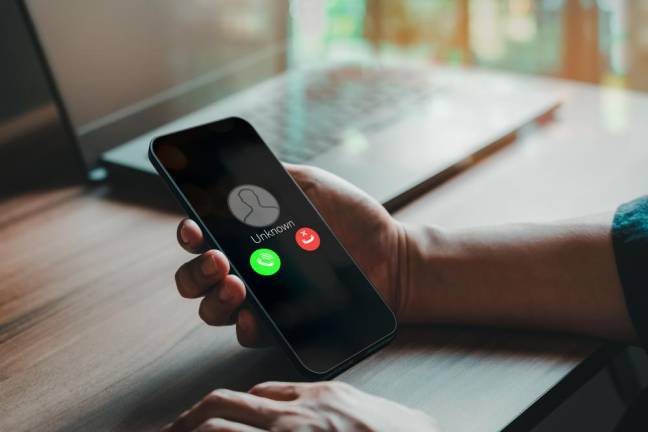Scammed out of thousands, locals share their stories
Scams. The first of a two-part series on local scams.

No one ever wants to believe that it can happen to them, but scammers and their schemes are ever-evolving. For one 74-year-old Warwick, N.Y. resident, the previously unthinkable happened this past summer, and she’s still trying to recover financially and psychologically.
“I think they came after me because I’m older and live independently,” the resident said. “And they preyed on my instinct to keep my children and grandchildren safe.”
She requested to remain anonymous due to ongoing fallout from the incident, but wanted to share her story as a cautionary tale. That story begins on a Sunday night in July 2022.
“I was driving home when I got a call from someone who said they were from the DEA (Drug Enforcement Agency). He told me that I was in serious trouble and grave danger,” she said. “And that I needed to pull into somewhere safe, stay on the phone, and follow their instructions.”
The “DEA agent” informed her that her identity had been stolen and used to open bank accounts and rent a car, which allegedly had been stopped and searched at the Mexican border, and found to be carrying drugs. The scammer informed the resident that she was going to be charged with drug trafficking and bank fraud, with only a short time to empty her bank accounts before assets were frozen.
“I had pulled into the ShopRite parking lot,” she said, “I was instructed to go inside and get as many gift cards as I could and give the caller the numbers.”
Unsatisfied, the scammer then directed her to go to Price Chopper and do the same. Over the next two days, the scammer had her deposit a large amount of cash into a Bitcoin machine and send a wire transfer to Hong Kong.
“They kept me paralyzed by fear, telling me that if I spoke to my family or friends, those people would be charged as accomplices. I was so scared and was focused on having my identity ‘stolen’ that I couldn’t see what was happening,” the resident said, “I was being used as a puppet, and they were pulling my strings.”
On the fourth day of the scam, a light bulb went off.
“I was walking my dog and just snapped out of it. It’s like I was hypnotized, and the spell wore off. I stopped answering their calls and went to the police.”
The Warwick Police Department opened a case, but it’s unlikely that anything will come of it.
“The police gave me resources,” she said, “but it’s not just the money. It’s the trauma. I’m educated with lots of life experience, and they still got me. Maybe the two years of isolation from the pandemic made me more vulnerable. It’s still taking time to work through what happened.”
Preying on fear
Fear is also what Hamburg, N.J. resident Heather Marrocco said recently caused her to fall for a utility scam.
“The caller said they were from JCP&L and that our power was going to be shut off in 15 minutes unless we sent money via Zelle directly to the field technician as proof of our payment,” she said, “It was a cold evening, and I was so scared of going without light or heat.”
Marrocco said she and her fiancé were so overwhelmed by the “ticking clock” described by the scammer that they agreed to send an initial payment of nearly $200, but the scammer took it further and said that the payment wasn’t working. Told they would send her a code for a refund, and after some back and forth and phone transfers to “supervisors,” Marrocco entered the supplied code. That action triggered cascading payments which eventually took just under $2,000.
“That’s when we realized,” she said. “My fiancé kept them on the line, and when he called them out as scammers, we could hear laughter. It was infuriating. It happened so fast and escalated so quickly. I used to work in banking, and I know I should know better. But that fear, they just play on it to get you to do anything they say.”
Marrocco believes she may have been targeted because she’s previously used utility assistance programs and the scammers likely acquired that database. She is working with the Zelle fraud team to get her money back, with no results yet. In 2021 alone, users reported an estimated $440 million lost to fraud on the popular peer-to-peer payment platform.
“I’m fighting,” Marrocco said. “And I want to tell other people to know their rights and resources. And don’t give up until you get answers. I don’t want this to happen to anyone else.”
Protect yourself
In addition to the federal agency scams and utility scams detailed above, some current “popular” scams to be aware of are:
• The Amazon scam: The scammer informs the target of an “issue” with their Amazon account. When the target confirms their account info, the scammer uses the account to purchase high-end items and steal payment data.
• The grandparent scam: The scammer pretends to be a grandchild in financial or legal trouble. When the target collects money to aid them, the scammer sends a fake car service to pick up the cash or gift cards, and drives off, making the assets untraceable.
• The love-bomb scam: The scammer poses as a potential partner on dating sites, grooms the target to believe they are deeply in love without ever meeting in person, and then asks for money to alleviate financial troubles. Upon receiving the assets, the scammer becomes unreachable and untraceable.
According to local law enforcement, if anyone suspects a scam, they should call their nearest police department to report it and receive assistance. Local police also want to remind the public that government agencies primarily conduct business by mail, not over the phone or via text message.